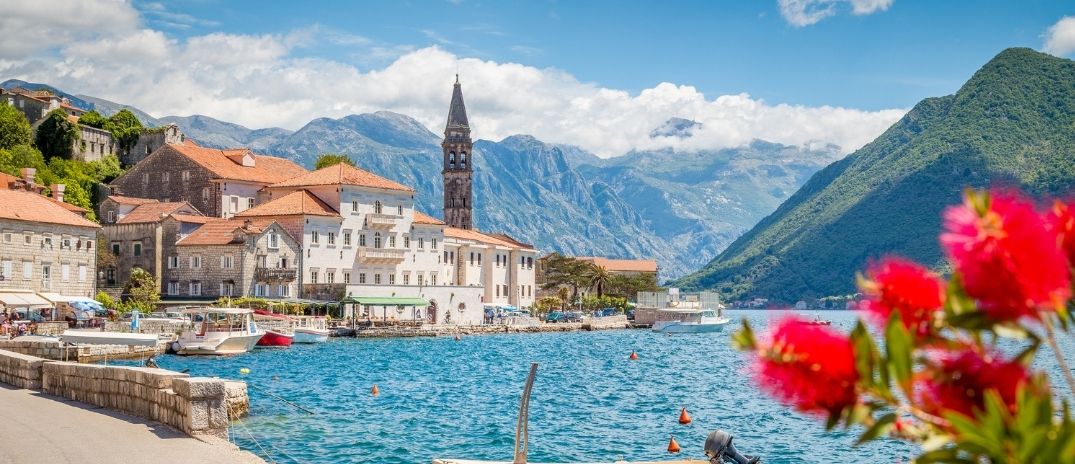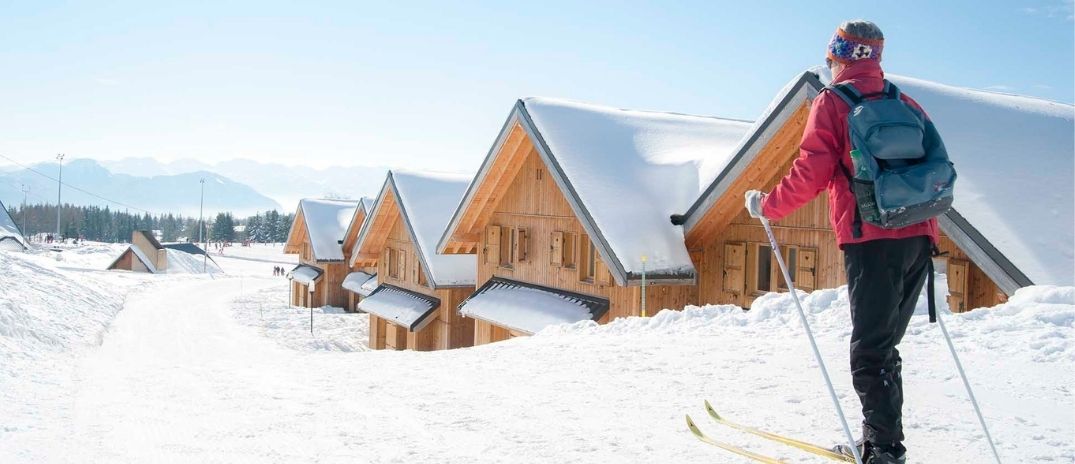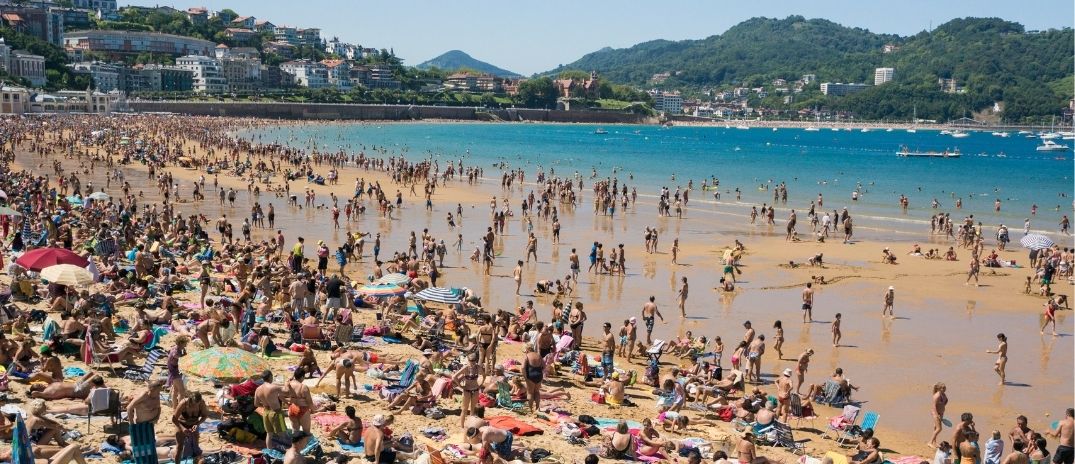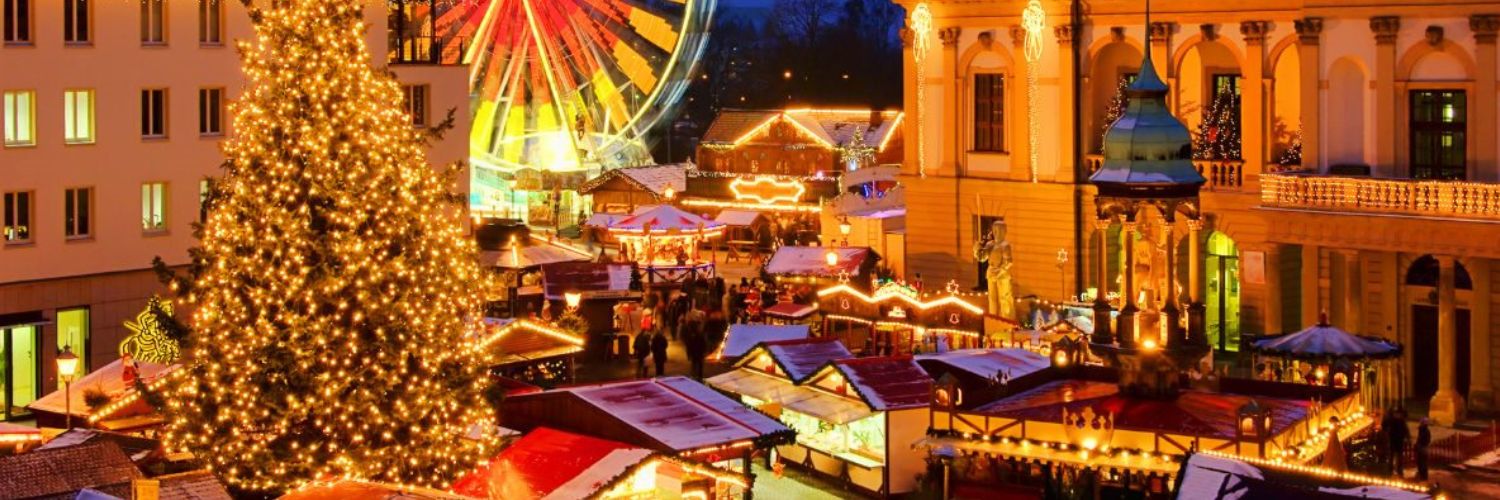Luckily, there are plenty of smart strategies you can use to save money without sacrificing your holiday experience. Here are 10 tips to for a cheap holiday in 2025.
When to book cheap holidays in holiday parks and homes across Europe

Booking a holiday in Europe, whether it’s a cozy vacation home in Belgium or a family-friendly holiday park in Germany, can be an affordable and memorable way to experience the continent. However, timing plays a crucial role in securing the best deals. If you're looking to enjoy a budget-friendly getaway while staying in a holiday park or vacation home, knowing when to book can make a significant difference in cost.
Early bird (early booking): lock in the best deals early, the cheapest holiday booking
One of the best ways to snag a cheap holiday is by booking early. Holiday homes, hotels, and travel companies often offer significant discounts to customers who reserve months in advance. If you have a clear idea of where and when you want to travel, locking in your plans early can help you save a substantial amount. Many early bird offers come with perks like free upgrades or discounted activities.
Travel experts suggest that booking short-haul flights about five months in advance can yield savings of nearly 50% on both flights and accommodations. For long-haul trips, it’s best to book six months ahead, with potential discounts reaching up to 55%.
Holiday parks often roll out enticing deals to fill holiday homes and rooms early, so booking ahead not only gives you access to competitive rates but also ensures you get the best choice holiday homes, including family suites or special options such as wellness inspired holiday homes or ones directed at families with children. Early booking offers (EBOs) and low-deposit options make early reservations even more appealing. Travel operators can offer early booking deals as the end of the previous year approaches, so planning your next holiday in September isn’t such a crazy notion.
Last minute & super last-minute: embrace spontaneity
While early bookings offer great deals, last-minute travelers can also find bargains. Travel providers sometimes slash prices on unsold inventory at the last minute to avoid vacancies. If you're flexible with your dates and destinations, jumping on last-minute or even super last-minute deals can result in deep discounts on flights and accommodations. Apps like HotelTonight and websites such as Skyscanner are great resources for this.
While future trends in holiday prices are never entirely predictable, many travel agents reported an increase in last-minute bookings this year. If you’re flexible with your destination and dates, waiting until the last minute can sometimes score you exceptional deals. However, bargains are rare during peak travel times, so be prepared for limited options, and keep in mind that last-minute prices can even rise, particularly for package holidays.
For low-budget holidays, it’s unlikely you’ll find cheaper rates by waiting, except perhaps for off-peak dates to less popular destinations. For these types of trips, prices tend to increase steadily as the travel date approaches.
Advantages of booking a last-minute holiday

Booking a last-minute holiday can bring a sense of spontaneity and reduce planning stress. With less time to wait, you can feel confident that your chosen destination is open, safe, and welcoming to travelers.
If you can avoid peak months like July and August, booking during the “shoulder seasons” offers the added perks of fewer crowds, a more peaceful experience, and often lower rates. This makes it easier to fully enjoy the destination at a more relaxed pace.
The excitement of a last-minute trip can be refreshing for you and your travel companions—no months-long countdown, just the thrill of an upcoming adventure. If you’re heading to the mountains, you can also check the snow forecast before booking to increase your chances of a snowy, action-packed break. With mobile apps, last-minute bookings are convenient and can be made instantly, anytime, directly from your smartphone.
Holiday booking tips: steps to book a last-minute low-budget holiday
Step 1: For cheap travel, research the market
Start by browsing package holiday and comparison websites to get a sense of the best last-minute offers available. Make a note of the most competitive package prices and compare these to the cost of booking flights and accommodation separately.
Step 2: Sign up for offers
Once you’ve identified the company with the lowest-priced package, subscribe to their newsletter for updates on discounts and exclusive deals. This way, you’ll receive notifications as soon as new discounts become available.
Step 3: Explore flash-sale sites
When you're set to travel within the next 48 hours, check flash-sale sites. These platforms often list exclusive deals that may not appear on traditional comparison sites.
Step 4: Stay flexible and reach out
Rather than sticking to online listings, consider calling a tour operator or travel agent directly. They often have insider knowledge on upcoming last-minute availability. Additionally, try searching around your preferred dates and adjusting filters, such as board options or star ratings, to uncover the best prices. Flexibility with dates and amenities can lead to significant savings on your holiday.
If you can shift your travel dates by even a day or two, you’ll often uncover more attractive discounts. Being flexible with your destination also helps—consider quieter spots like Lucca instead of bustling Florence. These areas are less crowded, may have more deals, and often provide a unique perspective on local culture and character.
Step 5: Analyze customer reviews
Before finalizing your booking, take a moment to check customer reviews of the apartment or holiday home. Hearing from previous guests will give you a sense of what to expect and help you ensure you're booking a well-regarded place.
Step 6: Timing is everything
For the best deals, try booking at the end of the season, during off-peak times, or opt for mid-week flights, as these options tend to be less expensive.
Step 7: Don't Be Afraid to Negotiate
Once you’ve found your ideal holiday, consider calling the travel agent directly to negotiate the price for the cheapest holiday booking possible. While it’s becoming more challenging to haggle, it’s always worth a try. If you’re not comfortable negotiating, ask a friend or family member with a knack for it to help.
Midweek instead of Weekend: skip the weekend rush
Most people prefer to travel on weekends, making Friday to Sunday the most expensive days to fly or book a hotel. Instead, consider booking your holiday during the week. Midweek flights (especially on Tuesdays and Wednesdays) and accommodations are often cheaper, saving you money while avoiding the crowds.
Before committing to being a weekend traveler, consider that experts suggest you can often find better prices and additional benefits by choosing to travel during the week. While weekend trips can help you conserve vacation days, opting for weekday travel can provide significant advantages in terms of cost and convenience.
Traveling midweek can lead to savings on holiday home and hotel rates and transportation, as well as a more pleasant experience due to fewer crowds. Additionally, many hotels offer midweek discounts or special promotions to attract guests.
Tuesdays and Wednesdays are typically the best days to travel to avoid crowds and take advantage of lower fares. Leisure travelers often inflate prices and create congestion on weekends, while business travelers usually travel from Monday to Friday, impacting availability around the weekends.
In simple terms, there are generally fewer travelers during the week, which means you’ll have more options and lower rates for accommodations that could significantly increase in price by the weekend.
For instance, we chose a cozy holiday home, situated on one of the most beautiful beaches in Zeeland and calculated how much would one person save with booking during the midweek instead of the weekend. For a beautiful holiday home in Koudekerke, Zeeland, Netherlands, staying during midweek saves approximately 12.04% compared to the weekend rate.
Holiday home and hotel perks during midweek
Traveling during the week can significantly benefit you, particularly in terms of accommodations. With lower occupancy rates, you’re more likely to receive a complimentary room upgrade. Hotels and holiday parks often provide promotions to encourage midweek stays, especially during the shoulder season. Additionally, midweek travel increases your chances of securing early check-in, enjoying less crowded amenities like the pool, and having more options for dinner reservations.
Cheaper attractions and entertainment
Midweek travel often comes with generous discounts on tickets to various attractions and entertainment options. Additionally, you can expect significantly fewer crowds at popular tourist sites, restaurants, and facilities compared to weekends.
Imagine being the first in line at the monkey enclosure at the zoo, walking straight onto a ride at an amusement park, or easily booking a same-day tour without the hassle of rescheduling. By choosing to visit attractions during the week, you can skip the long queues and enjoy a more relaxed atmosphere, making your experience far more enjoyable.
Travel in the shoulder season: avoid peak prices
Peak season comes with peak prices. By traveling during the shoulder season—just before or after the peak months—you can enjoy the same destinations at a fraction of the cost. For example, in Europe, traveling in May or September often means better deals and fewer tourists. The weather is still pleasant, and you’ll have more room to explore without the high-season price tag.
Shoulder season varies depending on the destination, but it generally refers to the period between a region's peak season and its offseason. This period can last for several months or just a few weeks. For example, if summer is the peak season and winter is the offseason, then spring and fall would represent the shoulder seasons. Alternatively, a destination may see peak travel during a holiday weekend, with demand dropping significantly before or after; these times can also be classified as shoulder season.
Traveling during these less popular periods can lead to substantial savings. For instance, flights tend to be significantly more expensive during the holiday season, which is one of the busiest times of the year for travel. According to an analysis of nearly 600 travel itineraries in August 2024, journeys planned for the week of Christmas showed a significant increase in demand compared to those booked for late August, a period often seen as a "shoulder season" as families settle into the school year.
While demand is high during peak season, it can plummet during the offseason, sometimes leading to closures of the very attractions you want to visit. For example, boat tour operators may shut down for the winter, and quaint ski town cafes could close in the summer. Hotels often use the offseason for renovations, which may mean certain amenities, like pools, are unavailable. Additionally, airlines may reduce their routes, limiting your flexibility in travel days and times.
In contrast, shoulder season typically avoids these challenges. If you travel before the summer crowds arrive, you might find a newly renovated hotel room ready for your stay. Visiting the mountains just after the winter holidays allows you to enjoy the snowy slopes with fewer skiers around.
Moreover, shoulder season often boasts more pleasant weather, avoiding the extreme heat or storms associated with the offseason. In fact, the climate during shoulder season can sometimes be even more enjoyable than during peak travel times.
We tested out this theory in practice, many times. One such situation was a holiday at the beginning of September in Barcelona. With the summer crowds gone and the crisp air bringing a refreshing calm, this shoulder season was ideal for discovering the architectural wonders, rich history, and coastal charm of the Catalonian city.
Pre-Christmas is the best time to book a ski break

Pre-Christmas is the ideal time to book a ski trip. In the past 2 years, we've seen peak dates in the ski industry filling up much earlier than usual. For instance, weeks like the February half-term were already over 80% booked, making early reservations essential during winter.
As skiers shift their attention to holiday shopping, bookings often slow down, creating an opportunity for strong discounts. Travelers should take advantage of this change in focus to secure great deals. If you come across significant savings, such as a buy-one-get-one-free lift pass offer, it's advisable to book your holiday quickly, as these types of deals tend to sell out rapidly.
Avoid the big city: opt for hidden gems
Big cities are typically more expensive, especially during popular holidays and events. Consider staying in smaller towns or lesser-known destinations that offer just as much charm. For example, instead of Paris, explore quaint French villages, or skip Rome in favor of Tuscany’s countryside. You'll still enjoy beautiful sights without paying a premium.
Big cities are notoriously expensive, from high-end restaurants and pricey accommodations to costly entry fees for popular attractions. Visiting less touristy destinations can be significantly easier on your wallet. Small towns often offer more budget-friendly accommodations, dining, and activities, allowing you to stretch your travel budget further. For families or travelers looking to maximize their experience without overspending, avoiding large cities can be a practical choice.
Avoiding large cities means skipping the packed tourist attractions and long lines they often come with. By heading off the beaten path, you can explore beautiful landmarks, historical sites, and natural wonders without the crowds. This provides a more intimate and unhurried experience, allowing you to appreciate each place at your own pace.
This idea is also a tried and tested one, with trips to Florence and its neighboring small villages and coastal towns, we lived like locals, spent less time traveling and saved more money by not partaking in touristy activities.
Travel locally
In an era of international travel and flights to far-flung destinations, there's something incredibly rewarding about exploring your own country. Traveling locally within Germany, the Netherlands, Belgium, or Luxembourg offers a unique and fulfilling holiday experience. By choosing to vacation closer to home, you can enjoy the luxury of fewer travel hassles, lower costs, and deeper connections to the places and cultures around you.
Local travel allows you to take full advantage of your time off without the stress of long airport lines, security checks, or lengthy flight delays. It also gives you more flexibility to relax and explore at your own pace, whether you’re planning a long weekend, a family vacation, or a peaceful retreat.
Holiday parks and vacation Homes are among the best ways to explore the beauty of your country. These types of accommodations offer the perfect balance of comfort and nature. You can enjoy spacious lodges, cozy cabins, or fully equipped vacation homes while staying in picturesque regions that you might not have considered before. Whether you’re renting a home in the heart of the Black Forest in Germany, staying in a charming holiday park near the Dutch coast, or booking a cozy cabin in the Belgian Ardennes, the options for local getaways are vast and varied.
Book a large house or villa: share and save

If you're traveling with friends or family, booking a large house or villa can be a cost-effective way to enjoy luxury without breaking the bank. By splitting the cost between a larger group, you’ll often get more space, better amenities, and a more relaxed experience than in individual hotel rooms.
Scenario: family or friend group of 8 people
We have compared an 8-person holiday home in Parc Maasresidence Thorn to a hotel room of a similar standards located in the nearby town of Thorn to have a fair comparison based on geography and local culture.
Let’s see the total cost of staying in an 8-person holiday home versus booking 4 hotel rooms for 2 people each, given that:
- The holiday home costs €1,216 for 6 nights (10.11.2024 to 16.11.2024).
- A hotel room in Thorn costs €282 for 3 nights.
- To match the 6-night duration, each hotel room would need to be booked twice (two 3-night bookings).
1. Calculate Total Cost for 4 Hotel Rooms
- Each hotel room costs €282 for 3 nights, so for 6 nights (two bookings), the cost per room is: 282×2=€564282 \times 2 = €564282×2=€564
- Since 4 hotel rooms are needed for 8 people: 4×564=€2,2564 \times 564 = €2,2564×564=€2,256
2. Holiday Home Cost Comparison
- Total Cost of Holiday Home: €1,216 for 6 nights
- Total Cost of 4 Hotel Rooms: €2,256 for 6 nights
3. Calculate Savings
- By choosing the holiday home over the hotel rooms, the total savings are: 2,256−1,216=€1,0402,256 - 1,216 = €1,0402,256−1,216=€1,040
4. Additional Benefits of the Holiday Home
Aside from the €1,040 savings, the holiday home offers:
- Kitchen facilities: ability to cook meals, reducing dining costs.
- Common living spaces: ideal for socializing, especially in a group.
- Private group setting: greater privacy and comfort than separate hotel rooms.
Opting for the 8-person holiday home saves €1,040 over the 6-night period and provides better amenities for a group stay, making it a more economical and convenient option than booking 4 separate hotel rooms.
Save big by shopping at local supermarkets while on vacation

One of the easiest ways to save money while traveling is to shop at local supermarkets for essentials, snacks, and even meals. Dining out can quickly add up, especially in tourist-heavy areas, but buying groceries and cooking for yourself or prepping picnic-style meals can significantly cut down costs. Here’s a look at how much you can save by hitting the local supermarket instead of eating out every day, with examples to show the difference in euros.
1. Cost comparison: eating out vs. shopping at a supermarket
Let’s break down some common travel meals to see the difference in cost:
Breakfast:
- Café Breakfast (per person): a coffee and pastry at a café can cost around €7.
- Supermarket Breakfast: a loaf of bread (€1.50), a dozen eggs (€3), and a jar of jam (€2.50) from the supermarket will cover breakfasts for several days, costing roughly €7 for the whole group per day.
- Total Savings: if you’re traveling as a group of 4, that’s €28 at a café versus €7 from the supermarket, saving €21 each morning.
Lunch:
- Restaurant lunch (per person): a simple lunch in a local restaurant can run about €15–€20 per person.
- Supermarket lunch: fresh bread (€1.50), cheese (€2), ham (€3), and some fruit (€2) from the supermarket can feed 4 people for about €8–€10.
- Total savings: for a group of 4, this means paying €60–€80 at a restaurant versus around €10 from the supermarket, saving between €50 and €70 per lunch.
Dinner:
- Dinner out (per person): dinner at a mid-range restaurant can cost around €25 per person.
- Supermarket dinner: for example, pasta (€2), fresh vegetables (€3), sauce (€2), and a bottle of wine (€5) can make a full dinner for 4 people, totaling around €12.
- Total savings: a restaurant dinner for 4 would be €100, while a homemade dinner would be about €12, saving €88 per night.
2. Additional benefits of shopping locally
Beyond cost savings, shopping at a local supermarket also lets you experience authentic, locally sourced ingredients. Many supermarkets carry unique regional specialties—like French cheeses, Italian pasta, or Spanish cured meats—at a fraction of what these items might cost in a restaurant. Plus, cooking with local ingredients can be a fun part of your holiday experience, giving you a taste of the local cuisine without the restaurant prices.
3. Budgeting tips for supermarket shopping
- Plan simple meals: opt for simple, versatile ingredients like bread, eggs, pasta, fresh produce, and local spreads or sauces. These are often affordable and can be used in multiple meals.
- Local treats for less: most supermarkets carry local snacks and treats that cost far less than at tourist shops. For example, a pack of croissants might be €2 at a supermarket versus €4–€5 at a bakery.
- Buy in bulk: if traveling as a group, buying family-size packages can save even more per person. Look for family packs of basics like bread, fruit, and bottled water.
Dining out for every meal on holiday can be expensive, but local supermarkets offer the chance to cut meal costs dramatically. By shopping and cooking even one meal a day, you can save upwards of €100 per person over a week-long holiday—more than enough to splurge on a memorable meal or activity. For travelers on a budget, the supermarket is your friend, offering not only savings but also a deeper connection to the flavors and culture of your destination.
Cheap holidays with children

Traveling with children can sometimes seem like a daunting, expensive endeavor, especially when considering the costs of flights, accommodation, meals, and activities. However, family holidays don’t have to break the bank. With a bit of planning and flexibility, you can enjoy a memorable and affordable trip, whether you're staying in a holiday park or renting a vacation home. Here are some tips for planning a budget-friendly holiday with children in Europe.
Stay in family-friendly holiday parks
Holiday parks across Europe are some of the best options for a cheap family holiday. They offer a variety of accommodations, from budget-friendly cabins and mobile homes to more luxurious lodges. In addition to affordable pricing, many of these parks are designed with families in mind, offering a range of kid-friendly facilities and activities that will keep your children entertained without additional costs.
For example, in the Netherlands, many holiday parks are set in picturesque countryside locations and include bike rentals, playgrounds, swimming pools, and kids’ clubs. In Belgium, you can stay at parks near the Ardennes or the Belgian coast, where you’ll find nature trails, adventure parks, and outdoor play areas. In these settings, you’ll often find discounts for longer stays or off-season bookings, making them an even more affordable option for families.
Holiday parks often have all-inclusive deals that provide access to on-site amenities like entertainment, kids’ clubs, and sometimes even meals, which can save you money on dining out. Additionally, staying at a holiday park allows you to prepare your own meals, keeping food costs low while still enjoying the freedom of a full vacation experience.
Use vouchers and browser plugins: hunt for discounts
Before finalizing any bookings, check for discounts and vouchers. Websites like Groupon or Postcode Loterij often have travel deals and vouchers for holiday packages. Additionally, install browser plugins like Honey or Rakuten, which automatically search for and apply coupon codes during checkout. These little savings can add up to a big difference.
Be on the lookout for sales during key times of the year, such as Black Friday, Cyber Monday, and January sales, when many travel companies offer significant discounts, advises Hentschel.
Utilizing flight comparison websites and setting up price alerts for your preferred destinations can also help you score great deals when prices drop. Since airline and holiday home prices fluctuate constantly, booking during non-peak hours is another effective strategy for saving money.
Best browser extensions for travel booking, flight search, and hotel discounts
Most of us use Chrome on our desktops or mobile devices to book flights, research cheap trips, and pay for hotels. As the most popular web browser worldwide, it’s likely that over half of you reading this are using Google’s platform.
A significant reason for Chrome's widespread use is the availability of optional extensions—add-ons that enhance the browser’s capabilities. These extensions range from productivity tools to entertainment options, and many can even help you save money on budget travel.
Here’s a look at some Chrome extensions that can assist you in becoming a savvy traveler. Most of these tools are also compatible with Microsoft Edge, Brave, and Opera browsers: Ratepunk. Peanut, Honey, Cently, Flight Fare Compare.
The best online options for travel vouchers and deals
Using deal and voucher sites effectively can help you save money, find unique experiences, and make the most of your budget travels.
- Germany: eBay Kleinanzeigen and eBay Deals feature discounted holiday vouchers, Mydealz is a community-driven platform for travel discounts and voucher codes.
- Belgium: SNCF Belgium provides discounted train travel packages, Outspot specializes in outdoor experiences, travel packages, and wellness retreats.
- The Netherlands: Social Deal provides localized discounts for short cheap trips. Outspot features deals on travel packages and wellness retreats, NS Spoordeelwinkel offers affordable travel packages with train tickets, hotels, and attractions, Tripper.nl offers daily deals on activities, amusement parks, and travel packages.
Groupon offers deals on dining, leisure, wellness, and holiday packages in Germany, the Netherlands, and Belgium.
Flash sales for budget travel: act fast for big discounts

Flash sales are another great way to score a bargain. Holiday parks, hotels and travel companies periodically offer heavily discounted rates for a limited time. These sales are often promoted via email or on social media, so keeping an eye on your favorite travel companies is key. Timing is everything—flash sales don’t last long, so be ready to book when you spot a deal.
In today’s fast-paced travel industry, the concept of a "Flash Sale" has gained traction among travelers seeking fantastic deals on accommodations, flights, and vacation packages. A Flash Sale is a time-sensitive promotion offered by holiday homes, holiday parks, hotels, and travel agencies to entice customers and boost sales. These promotions usually run for a brief period, often between 24 to 72 hours, and feature significant discounts on various travel products and services.
Flash Sales create a sense of urgency, prompting travelers to make quick decisions when booking their trips. The limited timeframe means that customers need to act swiftly to secure discounted prices before the sale concludes. This marketing tactic has proven to be highly effective in driving sales and increasing revenue for travel companies.
Key features of flash sales
- Limited time offers: Ffash sales are time-sensitive promotions that last for a brief period, typically ranging from just a few hours to a few days. This urgency compels customers to act quickly and secure their purchases before the sale expires.
- Significant discounts: flash sales provide substantial savings on travel products and services, making them highly appealing to budget-conscious travelers eager to reduce their trip expenses.
- Exclusive deals: some flash sales are reserved for specific customers or loyalty program members, granting them access to special offers that may not be available to the general public.
Benefits of flash sales for travelers
- Cost savings: one of the primary advantages of flash sales is the potential to save money on travel costs. The deep discounts offered during these promotions can lead to substantial savings on flights, accommodations, and other travel services.
- Access to exclusive offers: flash sales frequently feature deals that are not accessible through other channels. By participating in these sales, travelers can unlock special discounts available only to a select group of customers.
- Opportunities for spontaneous travel: the brief duration of flash sales encourages quick decision-making when booking cheap trips. This can be particularly appealing to travelers who thrive on spontaneity and are eager to seize last-minute deals.
- Discovering new destinations: flash sales often include discounted rates for destinations that travelers may not have previously considered. This can inspire exploration of new places and lead to unique travel experiences.
Making the most of Flash Sales
- Sign up for alerts: subscribe to email newsletters and notifications from holiday parks, holiday homes, airlines, hotels, and travel agencies to stay updated on upcoming flash sales and exclusive offers.
- Follow on social media: stay connected with travel brands on social media platforms to receive real-time updates about flash sales, promotions, and last-minute deals.
- Be flexible: keep an open mind regarding travel dates, destinations, and accommodations to fully take advantage of the discounted prices offered during flash sales.
- Act quickly: when a flash sale is announced, act promptly to secure your travel plans before the sale ends or the available inventory runs out.
- Read the fine print: Before finalizing your purchase during a flash sale, carefully review the terms and conditions, including any restrictions or blackout dates that may apply.
Subscribe to Newsletters: stay informed about deals

If you're a savvy traveler looking for great deals and insider tips, subscribing to travel newsletters could be your secret weapon. Holiday parks, booking platforms, and hotel chains frequently send out exclusive offers, early booking deals, and last-minute discounts to their subscribers. Subscribing to a few key travel newsletters ensures that you won't miss out on great deals for your 2025 holiday.
1. Access to exclusive deals and discounts
Many travel companies reserve their best discounts and flash sales for their email subscribers. These exclusive deals can range from substantial discounts to special rates on accommodations, car rentals, and holiday packages. By subscribing, you put yourself at the front of the line for these money-saving opportunities. Sometimes, these deals are so good that they’re only available for a limited time or a select few subscribers—so checking your inbox can be worth the effort!
2. Early access to sales and peak travel discounts
For popular destinations, especially during peak travel seasons, early booking is key to finding affordable rates. Newsletters often give subscribers first dibs on holiday sales and booking opportunities, letting you secure lower prices before they’re released to the general public. Some travel platforms even provide “early-bird” access or send promo codes to subscribers, making it easier to plan a holiday that’s affordable without compromising on quality.
3. Last-minute offers to fill vacancies
If you’re flexible with your travel dates, newsletters can be a goldmine for last-minute offers. holiday parks and hotels frequently send out last-minute deals to fill unsold seats or rooms, and these can be significantly discounted. For spontaneous travelers, this is a perfect way to snag a bargain on short notice, while more flexible subscription options (like choosing specific destinations or types of deals) let you customize what kinds of alerts you want.
4. Tips and inspiration for your next adventure
Many travel newsletters don’t just focus on sales—they also send destination guides, travel tips, and inspiring stories that help you discover new places and plan more enjoyable trips. By staying subscribed, you’ll get ideas for under-the-radar destinations, seasonal highlights, and insider tips on local experiences that help you plan a unique and budget-friendly holiday.
5. Reward points and loyalty benefits
Loyalty programs often share their perks through newsletters, helping you earn reward points, miles, or discounts on future trips. Some travel brands even offer exclusive point-earning opportunities to newsletter subscribers, accelerating the benefits you can redeem for flights, hotel stays, or other experiences. These newsletters may also provide updates on limited-time rewards that give you more ways to stretch your travel budget.
Keep an eye on contests: win your next trip
Entering travel contests might sound like a long shot, but people do win! Many companies and brands run regular holiday giveaways, offering free flights, accommodation, or even complete holiday packages. Follow your favorite travel companies and bloggers on social media, and look out for contests that could land you a dream holiday for free.
Affordable holidays during the high season

When it comes to planning a holiday during the high season—typically summer and major holidays like Christmas or Easter — it’s easy to assume that prices will be sky-high. However, with the right strategies and a little bit of flexibility, it’s possible to have an affordable and enjoyable holiday even during peak travel periods. From choosing the right destinations to taking advantage of special offers, here’s how to make the most of your high-season holiday without draining your savings.
Choose less popular destinations
One of the best ways to save money during the high season is to avoid the most famous, crowded tourist destinations. Major cities like Paris, Rome, or Amsterdam can be incredibly expensive in the summer, especially when it comes to accommodation, dining, and activities. Instead, consider visiting less popular, yet equally charming, destinations.
For example, instead of the tourist-heavy parts of France, explore the quieter regions like Normandy or the Loire Valley. Instead of heading to Barcelona, consider exploring Valencia or Bilbao, where you can enjoy the Spanish culture without the inflated prices. Smaller towns or rural areas often have much lower accommodation costs, and you'll experience a more relaxed and authentic atmosphere. In Germany, the Black Forest or Bavaria offer plenty of natural beauty and attractions without the same price hike seen in larger cities.
Opt for off-the-beaten-path activities
High-season travel can mean expensive entry fees for popular attractions like museums, theme parks, or iconic landmarks. Instead, focus on free or low-cost activities that allow you to experience the destination without the premium price tag. Many European cities offer free walking tours, beautiful public parks, or free-entry museums on certain days of the week.
For example, in Bruges, you can wander the cobbled streets, enjoy a boat tour along the canals, or visit free attractions like the Belfry of Bruges. The key is to balance paid attractions with free or low-cost options, making the most of what your destination has to offer beyond the ticketed spots.
Stay in holiday parks or vacation homes
Holiday parks and vacation homes can be a much more affordable option than hotels, particularly during high season. These types of accommodations often provide better value for families or groups, as they come with cooking facilities and more space to spread out, meaning you can save on dining and hotel extras.
In the Netherlands, Belgium, Germany, and Luxembourg, holiday parks offer various accommodations, from simple cabins to luxury lodges, all with amenities that cater to families. Many parks have great facilities for children, including pools, play areas, and organized activities, allowing families to enjoy a more affordable vacation experience while avoiding high hotel rates. Plus, staying in a self-catering home or cabin means you can cook your own meals and avoid high restaurant costs that can add up quickly during the high season.
By combining smart strategies like early bookings, last-minute deals, and taking advantage of vouchers or flash sales, you can enjoy a budget-friendly holiday in 2025. Flexibility, planning, and a keen eye for deals are all you need to make your next adventure affordable and memorable!




